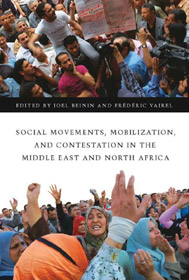Africa Books
they must be obtained directly from the publishers **
Book review
Social Movements, Mobilization, and Contestation in the Middle East and North Africa
edited by Joel Beinin and Frédéric Vairely (Stanford University Press, Stanford, California, US, 2011; 308 pp; pb $24.95)

When massive social uprisings shook Tunisia and Egypt in late 2010 and early 2011, and then quickly toppled those countries’ entrenched autocracies, much of the world looked on in surprise and wonder. Even many people in North Africa and the Middle East — long accustomed to seeing the slightest sign of defiance snuffed out by severe repression — did not expect that those protests would blossom into popular revolutions. But for close observers, including the contributors to Social Movements, Mobilization, and Contestation in the Middle East and North Africa, it was becoming increasingly evident in recent years that something was brewing in the region, and that despite the enormous obstacles to public expression, aggrieved sectors of the population were finding ways to organize, make connections and begin pressing for change. The bulk of the research and writing for this volume was completed before the upheavals of the “Arab Spring,” and the editors modestly admit that nothing in the book “predicts the insurrectionary movements that erupted in Tunisia and Egypt.” But since the book was not yet at press, they were able to add an afterword on the Tunisian and Egyptian events.
Though most of them were writing before the recent dramatic events, the book’s contributors nevertheless revealed a rich array of mobilizations that challenged the old simplistic images of a region that was either politically static or prone to irrational bouts of anti-Western terrorism. The case studies of Egypt, Lebanon, Morocco, Saudi Arabia and Turkey show that workers, unemployed professionals, rural poor, women, relatives of political victims and others were actively exploring very inventive ways of making their voices heard. The studies explicitly address some of the main academic theories of social movements — which generally have been developed in and applied to more industrialized societies in the North — and suggest how those theories work or fall short. A few, especially Beinin’s own analysis of Egyptian labour unrest, reinforce an old adage: while revolutions may rarely be predictable, they usually are preceded by foreshocks, even if those precursors may be fully appreciated only in hindsight.
— Ernest Harsch
Beyond Numbers: Narrating the Impact of Women’s Leadership in Eastern Africa, eds. Beverle Lax and Jane Godia (African Woman & Child Feature Service, Nairobi, Kenya, 2010; 116 pp; www.awcfs.org/new/resources/publications/books)
UN Peacekeeping in Africa: From the Suez Crisis to the Sudan Conflicts by Adekeye Adebajo (Fanele, Johannesburg, South Africa, 2011; 60 pp; free at www.ccr. org.za/images/pdfs/un_peacekeeping_synopsis_22aug2011.pdf)
Révolution numérique dans les pays en développement. L’exemple africain by Jacques Bonjawo (Dunod, Paris, France, 2011; 175 pp; pb €19)
And Still Peace Did Not Come: A Memoir of Reconciliation by Agnes Kamara-Umunna (Hyperion, New York, NY, USA, 2011; 320 pp; hb $22.99)
Les droits de la femme et de l’enfant, réflexions africaines by Stéphanie Lagoutte and Nina Svaneberg (Karthala, Paris, France, 2011; 240 pp; pb €29)
Facing Climate Change: Building South Africa’s Strategy by Stefan Raubenheimer (Idasa, Pretoria, South Africa, 2011; 168 pp; pb £19.95)
Dancing in the Glory of Monsters: The Collapse of the Congo and the Great War of Africa by Jason Stearns (PublicAffairs, New York, NY, USA, 2011; 400 pp; hb $28.99)
African Awakening: The Emerging Revolutions, eds. Firoze Manji and Sokari Ekine (Fahamu Books and Pambazuka Press, Oxford, UK, 2011; 329 pp; pb £17.95, pdf £14.95)
L’Afrique au futur conditionnel by Mathurin C. Houngnikpo (L’Harmattan, Paris, France, 2011; 284 pp; pb €25, e-book €18.75)
Successes in African Agriculture: Lessons for the Future, eds. Steven Haggblade and Peter B. R. Hazell (The Johns Hopkins University Press, Baltimore, MA, US, 2010; hb $90, pb $45)
Human Rights and African Airwaves: Mediating Equality on the Chichewa Radio by Harri Englund (Indiana University Press, Bloomington, IN, USA, 2011; 308 pp; pb $24.95)
L’Afrique subsaharienne: Une géographie du changement by Alain Dubresson et al (Armand Colin, Paris, France, 2011; 272 pp; pb €26.30)
Has Africa Shed its Third World Status? by Peter de Haan (The Lembani Trust, Lusaka, Zambia, 2011; 132 pp; pb £18.95)
Obasanjo, Nigeria and the World by John Iliffe (James Currey, Oxford, UK, 2011; 340 pp; hb $80)
Investissements pétroliers chinois en Afrique. Conséquences géopolitiques by Robert d’Aboville and Qian Sun (L’Harmattan, Paris, France, 2010; 189 pp; pb €18)
State Building and Democracy in Africa: A Comparative and Developmental Approach by John W. Forje (Nova Science Publishers, New York, NY, USA, 2011; 216 pp; hb $79, pb $43)
The Roots of Political Instability in Nigeria: Political Evolution and Development in the Niger Basin by E.C. Ejiogu (Ashgate Publishing, London, UK, 2011; 250 pp; hb $99.95)
Negotiating at the World Trade Organization by Vinod Rege (Commonwealth Secretariat, London, UK, 2011; 224 pp; pb £20.00, e-book £16.00)















